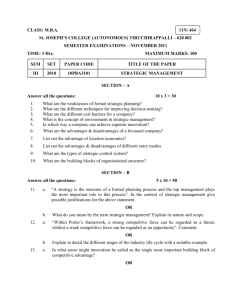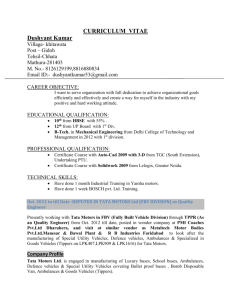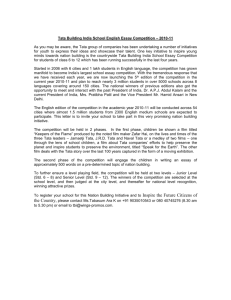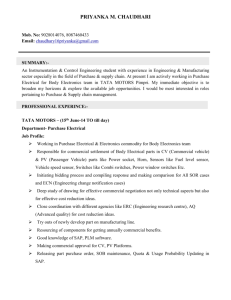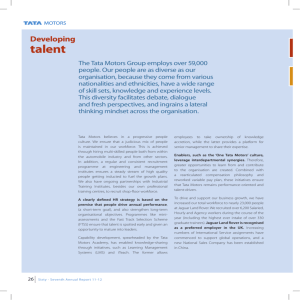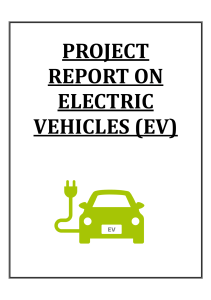Low Carbon Vehicle Technology Programme Tata Motors European Technical Centre
advertisement
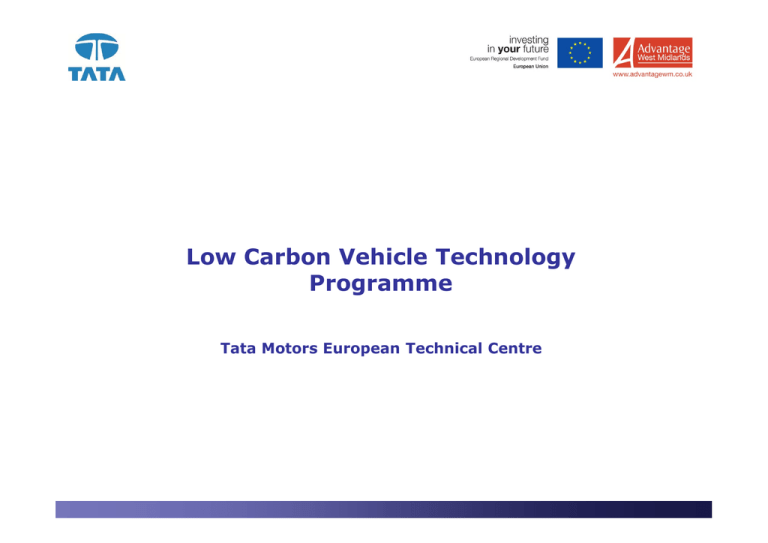
Low Carbon Vehicle Technology Programme Tata Motors European Technical Centre Contents • Tata Motors and its European Technical Centre (TMETC) • Advanced engineering of electric vehicles • LCVTP - What Tata wants − − − − Strategic direction ‘Beacon’ Vehicle concept Delivery priorities from LCVTP work-streams Hot spots where we invite creative input from suppliers and partners Tata Group - 98 companies in seven business sectors • • • • • • • Engineering Materials Energy Chemicals Services Information Systems & Communications Consumer Products Tata Motors 1945 Established 1954 Began manufacturing commercial vehicles in India in collaboration with Daimler Benz 2004 Acquired the Daewoo Truck Company 2005 Acquired a 21% stake in Hispano Carrocera 2005 Tata Motors European Technical Centre founded 2006 Joint venture with the Marcopolo Brazil, to manufacture buses and coaches 2007 Joint venture with Fiat in India to manufacture passenger vehicles, engines and transmissions 2008 Acquired Jaguar Land Rover 2009 Acquired remaining stake in Hispano Tata Motors India's largest automobile company 2nd largest Bus manufacturer globally 1st Engineering company to be listed on NYSE (2004) Top three for passenger cars sales in India 5th largest Bus & Truck manufacturer globally Largest portfolio of products: • Mini, Light & Heavy Trucks • Buses & Coaches • Passenger Cars & Utility Vehicles Largest R&D network in India with offshore centres in :Korea (Gunsan) Spain (Zaragoza) UK (TMETC - Coventry) Consolidated revenues of $14 billion in 2008-09 13% sales growth to Jan 2010 93% Jan 2010/Jan 2009 Tata breakthrough thinking - Ace • Mini-truck with the NVH of a passenger car • Launched May 2005 for just above £2500 equivalent • Created a new segment in India • Sales of 100,000 in just 20 months Tata breakthrough thinking - Nano For India at £1250 For Europe • Production start 2009 • Over 200,000 advanced orders Tata Motors European Technical Centre IARC Warwick University Campus Established in 2005 • Automotive engineering excellence • Drive the quality of TML vehicles • R&D, esp. disruptive technologies 200 Engineers Advanced engineering of electric vehicles Tata Indica Vista EV • • • • • • • ‘B’ Segment vehicle for four occupants with luggage Range of up to 200km Top speed of 128km/h Acceleration : 0 to 60 km/h in 9 secs ABS Advanced Li-Ion super polymer batteries Power dense electric powertrain – light and compact, with in-house transmission Indica Vista EV Shift-bywire Gear Selector HV PTC Heater TM4 PMMotor & Single Speed Transmission Super Polymer LiIon Traction battery modules and battery tray Traction Battery Charger DC-DC Converter Electric Vacuum Pump Coventry & Birmingham Low Emissions Demonstration … ‘CABLED’ Showcase demonstration of Ultra Low Carbon vehicles • • • • Based around Birmingham and Coventry 12 month vehicle trial phase starting 2010 Real world demo, to understand customer perceptions and concerns £14 budget - £7m public funding Consortium partners • Tata, Mercedes, Mitsubishi, JLR, Microcab, LTi • E-ON, Universities, City Councils and AWM Infrastructure • Electric charging points installed around cities of Birmingham and Coventry Vehicles • Over 100 battery powered, plug-in hybrid and hydrogen fuel-cell vehicles • Cross section of vehicle segments, various stages of development Tata Ace - electric LCVTP – What Tata wants More breakthrough thinking… The technology jump from Generation 1 to Generation 2 in electric vehicles • • • Commercially driven Globally targeted Affordable, practical for everyday use A full set of technologies to deliver an optimised ultra low carbon small family vehicle which sells in high volume Production target 2014/15 Current generation EV Conventional • vehicle structure • package layout Sub optimum • structural efficiency • space utilisation • aerodynamics • system integration • cost • etc ‘Beacon’ Vehicle Optimised Electric Family Car • • • • Ultra efficient package utilisation Drive-train efficiency improvement Cost optimisation Light-weighting and parts-count reduction Electrical energy storage HEVAC & thermal management Optimised Electric Family Car Braking & energy recovery Materials, structures, architecture LCVTP work-stream hot spots • Scalable lightweight structure for an optimised EV platform − Innovative BIW design; optimum material for application • Maximised battery energy density • Additional areas of emphasis for UK supplier/partner involvement: − − − − − − − − High torque to weight ratio motor technology HVAC systems for EVs, with battery heating and cooling in mind Expertise in electrical architecture and networking Steering systems for EVs including EPAS Braking systems for EVs and regenerative braking Waste energy recovery including heat from exhaust gases Expertise in Electric Vehicle Integration Drive by wire systems LCVTP work-stream hot spots • Scalable lightweight structure for an optimised EV platform − Innovative BIW design; optimum material for application • Maximised battery energy density • Additional areas of emphasis for UK supplier/partner involvement: − − − − − − − High torque to weight ratio motor technology HVAC systems for EVs, with battery heating and cooling in mind Expertise in electrical architecture and networking Steering systems for EVs including EPAS Braking systems for EVs and regenerative braking Waste energy recovery including heat from exhaust gases Expertise in Electric Vehicle Integration If you think you can help, come and talk to us!
